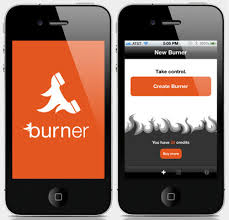Burner offers complete anonymity for its users by providing disposable phone numbers. This week, the company announced $2 million in new funding led by Founder Collective and Venrock.
The company says that David Frankel of Founder Collective and Marissa Campise of Venrock will not sit on Burner's board. Company TenOneTen, which is run by the L.A. Angels Gil Elbaz and David Waxman are also major funders.
Burner's app, Burner Detail Copy, was developed by the startup Ad Hoc Labs. The app is available on both iOS and Android. This app allows users to both place and receive calls, as well as send and receive SMS text messages. Users can set up custom voicemail greetings as well as configure different ringer and SMS notifications for each burner number they use.

The app has an iOS 7-friendly redesign with a focus on improved usability. The dashboard allows its users to better manage multiple numbers. Users can set up different greetings for multiple numbers and voice and text message centers.
The company generates its revenue by selling packs of credits to its users. Users get with these packs free; one-time trial for one day or five free voice calls or 15 free texts. To use the service more, they have to purchase other options that allow them to use Burner for a week or a month, or to make more calls or send more texts.
While co-founder Greg Cohn, the company’s co-founder, states that the company has seen steady month-over-month growth and revenue since it made the app a free download. “We really see everything, from dating and Craigslist and things like that you might expect, to teachers, lawyers, musicians, midwives, people posting lost-dog posters, and even celebrities. Those who use Burner for Craigslist and other user-to-user transactions represent Burner’s largest customer base. Knowing you can burn a number if you want to is sometimes more important than actually burning it,” Cohn explains.
“We’ve barely scratched the surface of privacy and identity on mobile, and carrier telephony is a ridiculously large market that doesn’t do innovation too well. There’s a lot of opportunity here, broadly speaking, and we believe our approach to having a voice-and-text communications vector that’s not carrier- or social-network-based is very attractive to a lot of people — as evidenced that people are willing to pay us for it,” Cohn added.
Cohn says that Burner's focus is now on building technology where phone numbers are smarter and act more like software. The company is small with less than 10 people, but with the new funding they say they have immediate plans to hire, especially engineers.
Edited by
Alisen Downey  QUICK LINKS
QUICK LINKS